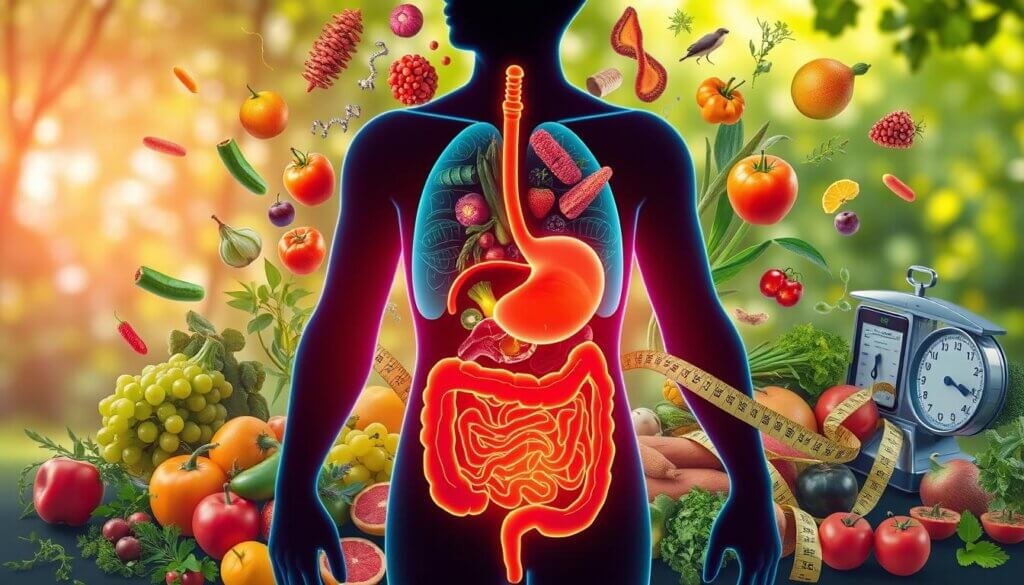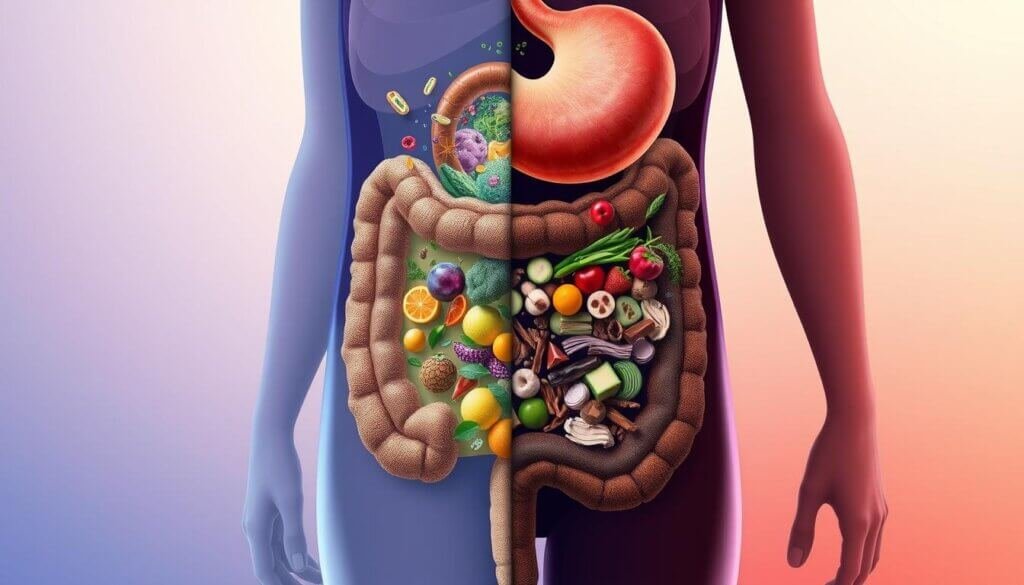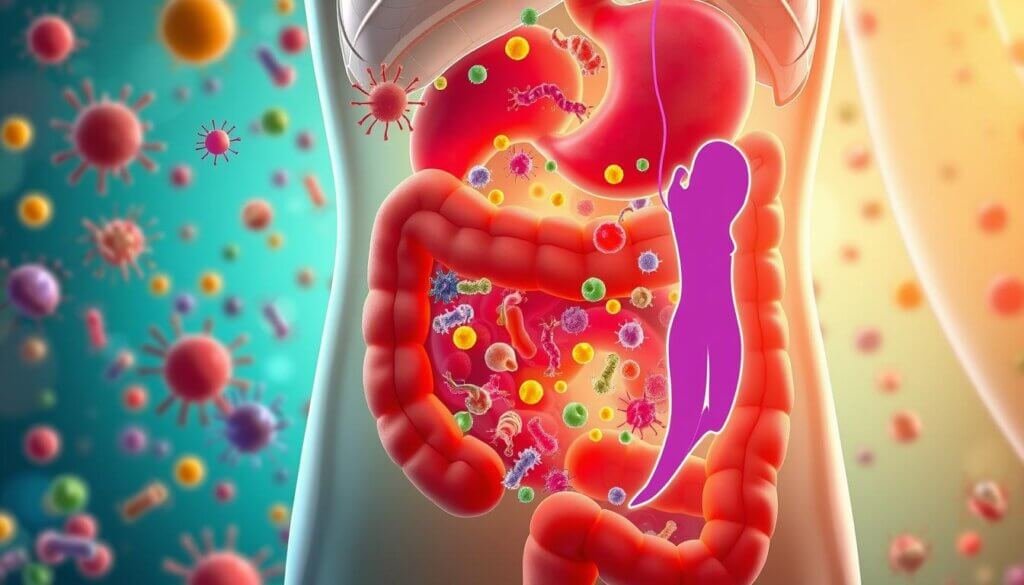Did you know 80% of Americans struggle with weight issues? The secret to lasting weight loss might not be just about calories. It could be about the balance in your gut microbiome. Research shows a strong link between your digestive health and managing weight.

Your gut microbiome is full of trillions of bacteria. It helps control your metabolism, hunger, and fat storage. If this balance is off, it can cause weight problems. Knowing how your gut affects your weight is key to losing weight for good.
Key Takeaways
- Approximately 80% of Americans struggle with weight-related issues, highlighting the importance of understanding the connection between gut health and weight management.
- The gut microbiome, a diverse ecosystem of trillions of bacteria, plays a pivotal role in regulating metabolism, appetite, and fat storage.
- Imbalances in the gut microbiome can lead to weight-related challenges, making it difficult to achieve sustainable weight loss.
- Exploring the relationship between gut health and weight loss is crucial for developing effective and long-lasting weight management strategies.
- on optimizing gut health can be a game-changer in your weight loss journey.
Understanding the Gut Microbiome's Role in Weight Management
Your gut microbiome is a community of trillions of bacteria in your digestive system. It plays a big role in managing your weight. This ecosystem affects your metabolism and body weight.
The Microbiome Ecosystem and Metabolism
The gut microbiome is complex and changes often. Each person has a unique mix of gut bacteria. These bacteria help break down nutrients, make vitamins, and control the immune system.
Some bacteria, like Firmicutes and Bacteroidetes, affect how your body uses calories. If their numbers are off, it can lead to weight gain.
How Gut Bacteria Influence Body Weight
The gut microbiome’s impact on weight is more than just metabolism. It also affects appetite, fat storage, and inflammation. All these factors can change your weight.
- Certain bacteria can send signals to the brain about hunger. This can change how much you eat and your weight.
- Some bacteria help store extra calories as fat, leading to weight gain.
- Imbalances in the gut microbiome can cause chronic inflammation. This can mess with metabolism and lead to weight problems.
Key Players in Your Digestive System
Knowing which bacteria do what in your gut can help with weight management. Some important ones are:
- Lactobacillus: These bacteria help with insulin sensitivity and less fat storage.
- Bifidobacterium: They help control hunger and keep the gut healthy, which can prevent weight gain.
- Akkermansia: This bacterium is linked to a leaner body and better metabolism.
By taking care of your gut microbiome, you can help manage your weight and stay healthy.
The Connection Between Gut Health and Weight Loss
Research shows a strong link between gut health and weight management. The bacteria, yeasts, and microbes in your gut affect your metabolism, appetite, and body shape.
A balanced gut microbiome with good bacteria helps with weight loss and weight management. But, an unhealthy gut can lead to weight gain and obesity.
| Healthy Gut Microbiome | Unhealthy Gut Microbiome |
|---|---|
|
|
Improving your gut health can help with weight loss and weight management. Eating gut-friendly foods and managing stress can support a healthier gut. This can help you reach your weight loss goals.
“The health of your gut is directly linked to your overall well-being and ability to maintain a healthy weight.”
How Poor Gut Health Leads to Weight Gain
Your gut health is key to your overall health, including keeping a healthy weight. An unhealthy gut can cause many problems that lead to weight gain. We’ll look at signs of a bad gut, common digestive issues, and how gut inflammation affects weight.
Signs of an Unhealthy Gut
Knowing the signs of poor gut health is the first step to solving weight problems. Some common symptoms include:
- Persistent bloating, gas, or stomach discomfort
- Frequent constipation, diarrhea, or irregular bowel movements
- Unexplained fatigue or low energy levels
- Skin issues like eczema, acne, or rashes
- Food intolerances or sensitivities
- Frequent infections or a weakened immune system
Common Digestive Issues Affecting Weight
Several digestive problems can affect your weight. These include:
- Leaky gut syndrome: This condition lets undigested food and toxins into the bloodstream, causing inflammation and weight gain.
- Small intestinal bacterial overgrowth (SIBO): An imbalance of gut bacteria can cause bloating, malabsorption, and weight management issues.
- Food sensitivities: Reactions to certain foods can cause inflammation, digestive problems, and weight changes.
The Inflammation Connection
Inflammation is at the heart of many gut-related weight issues. An imbalanced gut can cause chronic inflammation in the body. This inflammation can mess with your metabolism, hormone balance, and appetite, leading to weight gain. It’s important to tackle the root causes of gut inflammation for lasting weight loss.

Maintaining a healthy gut is essential for optimal weight management and overall well-being. By addressing the root causes of poor gut health, you can unlock the key to lasting weight loss and improved metabolic function.
Gut Bacteria and Their Impact on Appetite Control
Your gut bacteria are not just there to help you digest. They are also crucial in regulating your appetite. The community of microorganisms that populate your gut — called the gut microbiome — play a role in nestling hunger and fullness.
The gut-brain axis is a two-way communication system between your gut and brain. It allows your gut bacteria to send messages to your brain about hunger. Some bacteria, for instance, they secrete hormones like leptin that make you feel sated. They can also decrease levels of the “hunger hormone” ghrelin.
Previous research has identified certain bacteria that regulate appetite. Great for appetite control: Bifidobacterium and Lactobacillus species They also promote satiety and aid in weight loss. Maintaining a healthy gut microbiome is central for managing hunger and losing weight.
| Gut Bacteria Strain | Impact on Appetite |
|---|---|
| Bifidobacterium | Positively influences appetite-regulating hormones |
| Lactobacillus | Positively influences appetite-regulating hormones |
Understanding the link between your gut microbiome and hunger can help you lose weight. Eating foods that are good for your gut and living a healthy lifestyle can improve your gut bacteria. This can help you feel full and satisfied, leading to weight loss.

Dietary Strategies for Optimal Gut Health Weight Loss
A healthy gut is key for managing weight. Certain diets can help nourish your gut and aid in weight loss. Let’s look at the best dietary tips for a healthy gut and losing weight.
Fiber-Rich Foods for Gut Health
Eating foods high in fiber is crucial for a healthy gut. Fiber feeds the good bacteria in your gut. Here are some top fiber-rich foods:
- Whole grains like oats, quinoa, and brown rice
- Fruits and vegetables, especially berries, leafy greens, and cruciferous veggies
- Legumes, such as lentils, chickpeas, and black beans
- Nuts and seeds, including chia, flax, and almonds
Prebiotic and Probiotic-Rich Foods
Adding prebiotics and probiotics also helps your gut health and weight loss. Prebiotics feed probiotics, while probiotics are good bacteria. Here are some great sources:
- Prebiotics: onions, garlic, bananas, and whole wheat
- Probiotics: yogurt, kefir, sauerkraut, and kimchi
Foods to Avoid for Better Gut Balance
It’s also important to avoid foods that can harm your gut and lead to weight gain. These include:
- Processed and fried foods
- Sugary drinks and desserts
- Excessive alcohol consumption
- Antibiotics (unless medically necessary)
Focus on fiber-rich and probiotic foods, and limit harmful ones. This will help create a balanced gut environment. It supports your weight loss goals and overall health.

“A healthy gut is the foundation for a healthy body and mind. Nourish your gut, and it will nourish you in return.”
Lifestyle Factors Affecting Your Gut Microbiome
Improving your gut health for weight loss is more than just what you eat. Your lifestyle plays a big role too. Stress, sleep, and exercise all affect your gut’s balance.
Stress and the Gut
Too much stress harms your gut. It messes with the good bacteria in your gut. This can lead to weight gain and make losing weight tough. Try stress-reducing activities like meditation or yoga to help.
Sleep and Gut Health
Good sleep is key for a healthy gut microbiome for weight loss. Bad sleep can hurt your gut bacteria, causing inflammation and weight issues. Try to sleep 7-9 hours a night to help your gut and weight goals.
Exercise and Gut Diversity
Exercise boosts gut diversity, which is vital for improving gut health for weight loss. Mix cardio and strength training to grow good gut bacteria. This improves digestion and supports weight loss.
By focusing on these lifestyle areas, you can improve your gut health for weight loss. A holistic approach will help your gut-friendly habits show on the scale.
Building a Healthy Gut for Sustainable Weight Loss
Weight loss isn’t just about counting calories or following trends. It’s about building a healthy gut microbiome. This community of bacteria is crucial for your health. By focusing on a balanced gut, you can achieve lasting weight management.
Essential Steps for Gut Restoration
To improve your gut health and aid in weight loss, follow these steps. Eat more fiber-rich foods like fruits, veggies, whole grains, and legumes. These foods help the good bacteria in your gut and keep your bowels regular.
Add probiotic-rich foods like yogurt, kefir, and fermented veggies to your diet. They help bring back the good bacteria that might be missing.
Timing and Consistency in Gut Health Practices
Building a healthy gut is an ongoing journey. Make slow, lasting changes to your diet and lifestyle. It might take weeks or months to see big improvements in your gut health and weight.
Stay consistent with your gut-friendly habits. This will help you reach your weight loss goals in a healthy way.
Looking for more tips and insights? Explore our other articles in our Fitness blog!
FAQ
What is the connection between gut health and weight loss?
Your gut microbiome is a group of bacteria in your stomach. It affects how you metabolize food, feel hungry, and store fat. A healthy gut helps with weight loss, but an imbalance can lead to weight gain.
How do specific gut bacteria influence weight management?
Certain bacteria in your gut help you maintain a healthy weight. For instance, Bifidobacterium and Lactobacillus species boost fat burning and reduce fat storage. They also affect hunger hormones, which control your appetite.
What are the signs of an unhealthy gut?
Poor gut health shows in digestive problems like bloating and constipation. You might also feel tired, crave unhealthy foods, and have inflammation. These signs suggest an imbalance in your gut bacteria.
How can I improve my gut health for weight loss?
Eat foods rich in fiber and probiotics like fruits, veggies, and yogurt. Avoid processed foods and sugar. Stress, lack of sleep, and inactivity can harm your gut. Stay active and manage stress to keep your gut healthy.
What is the role of probiotics in weight loss?
Probiotics with beneficial bacteria can improve your gut health. They may help burn fat, reduce belly fat, and support a healthy weight. They work by affecting metabolism, appetite, and how you absorb nutrients.

